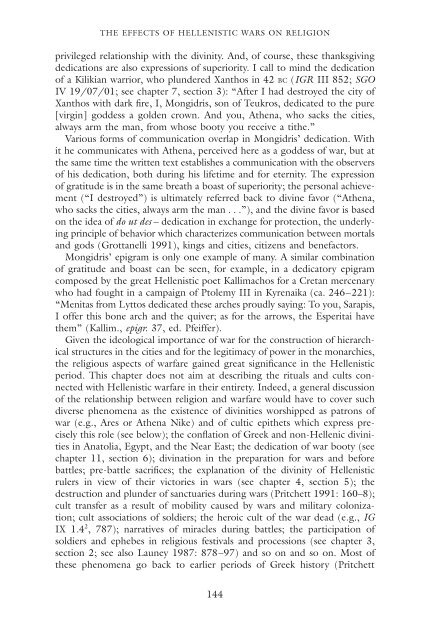WAR IN THE HELLENISTIC WORLD
WAR IN THE HELLENISTIC WORLD
WAR IN THE HELLENISTIC WORLD
Create successful ePaper yourself
Turn your PDF publications into a flip-book with our unique Google optimized e-Paper software.
<strong>THE</strong> EFFECTS OF <strong>HELLENISTIC</strong> <strong>WAR</strong>S ON RELIGION<br />
privileged relationship with the divinity. And, of course, these thanksgiving<br />
dedications are also expressions of superiority. I call to mind the dedication<br />
of a Kilikian warrior, who plundered Xanthos in 42 BC (IGR III 852; SGO<br />
IV 19/07/01; see chapter 7, section 3): “After I had destroyed the city of<br />
Xanthos with dark fire, I, Mongidris, son of Teukros, dedicated to the pure<br />
[virgin] goddess a golden crown. And you, Athena, who sacks the cities,<br />
always arm the man, from whose booty you receive a tithe.”<br />
Various forms of communication overlap in Mongidris’ dedication. With<br />
it he communicates with Athena, perceived here as a goddess of war, but at<br />
the same time the written text establishes a communication with the observers<br />
of his dedication, both during his lifetime and for eternity. The expression<br />
of gratitude is in the same breath a boast of superiority; the personal achievement<br />
(“I destroyed”) is ultimately referred back to divine favor (“Athena,<br />
who sacks the cities, always arm the man . . .”), and the divine favor is based<br />
on the idea of do ut des – dedication in exchange for protection, the underlying<br />
principle of behavior which characterizes communication between mortals<br />
and gods (Grottanelli 1991), kings and cities, citizens and benefactors.<br />
Mongidris’ epigram is only one example of many. A similar combination<br />
of gratitude and boast can be seen, for example, in a dedicatory epigram<br />
composed by the great Hellenistic poet Kallimachos for a Cretan mercenary<br />
who had fought in a campaign of Ptolemy III in Kyrenaika (ca. 246–221):<br />
“Menitas from Lyttos dedicated these arches proudly saying: To you, Sarapis,<br />
I offer this bone arch and the quiver; as for the arrows, the Esperitai have<br />
them” (Kallim., epigr. 37, ed. Pfeiffer).<br />
Given the ideological importance of war for the construction of hierarchical<br />
structures in the cities and for the legitimacy of power in the monarchies,<br />
the religious aspects of warfare gained great significance in the Hellenistic<br />
period. This chapter does not aim at describing the rituals and cults connected<br />
with Hellenistic warfare in their entirety. Indeed, a general discussion<br />
of the relationship between religion and warfare would have to cover such<br />
diverse phenomena as the existence of divinities worshipped as patrons of<br />
war (e.g., Ares or Athena Nike) and of cultic epithets which express precisely<br />
this role (see below); the conflation of Greek and non-Hellenic divinities<br />
in Anatolia, Egypt, and the Near East; the dedication of war booty (see<br />
chapter 11, section 6); divination in the preparation for wars and before<br />
battles; pre-battle sacrifices; the explanation of the divinity of Hellenistic<br />
rulers in view of their victories in wars (see chapter 4, section 5); the<br />
destruction and plunder of sanctuaries during wars (Pritchett 1991: 160–8);<br />
cult transfer as a result of mobility caused by wars and military colonization;<br />
cult associations of soldiers; the heroic cult of the war dead (e.g., IG<br />
IX 1.4 2 , 787); narratives of miracles during battles; the participation of<br />
soldiers and ephebes in religious festivals and processions (see chapter 3,<br />
section 2; see also Launey 1987: 878–97) and so on and so on. Most of<br />
these phenomena go back to earlier periods of Greek history (Pritchett<br />
144
















